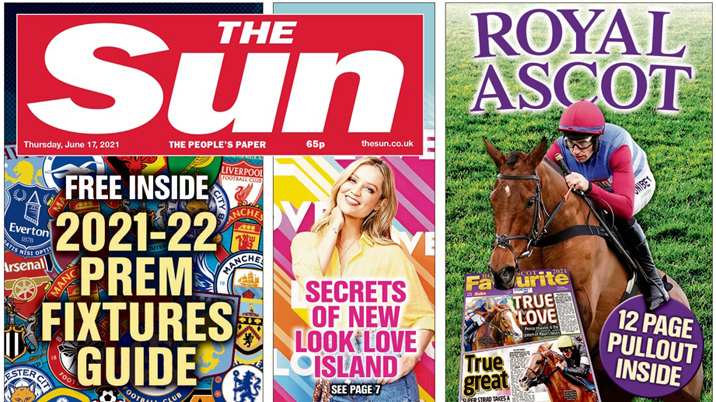
It’s when you tell it
When is a good day to bury bad news? When the Euros are starting, the US President is on his way and everyone’s fretting about whether the Prime Minister is going to keep us locked in for another month.
How is a good way to bury bad news? By spreading some not-quite-so-bad news about yourself.
Last week News UK released its annual figures in three separate reports to Companies House. They showed that The Sun had lost £201m and that its value as a News Corp asset had been written down to zero. “Aha!” chorused waggish Sun haters (of whom are many). “It really isn’t worth the paper it’s written on!” Some on social media hoped the haemorrhage would hasten the title’s demise; others thought they detected a tax dodge. You can find opinions and theories to suit every taste on Twitter.
But was this really news? It’s been clear for a long while that the paper’s finances were in a bad way – if only from the lack of trumpeting about how successful it had been. These were just the red crayonings to fill in an outline that was already easily identifiable. And they weren’t even recent colourings-in: these were figures up to June 28 last year. In other words, they were 347 days out of date.
The outline had been publicly available for ten months, since News Corp produced its annual report last August. That pointed to drops in UK revenue, “primarily” because of the decline in the Sun’s circulation. This report divides the Murdoch business into “segments” of which “News Media” is but one, encompassing newspapers and radio stations in the UK, US and Australia. It then breaks down the segment’s performance by country, highlighting the good points and explaining away the disaster (as all company reports are wont to do).
The interesting question here is why did it take News UK so long to publish the full figures.
Leaving it late
The interesting question here is why did it take News UK so long to publish the full figures, which also showed that Rebekah Brooks was paid £2.4m, that the Times and (two) Sunday Times editors took home a good chunk of £3m between them, and that the Times papers made a £10m profit.
Looking back at filings over the past 20 years, the papers have tended to publish their results in December, January or February. There have been occasional March or April appearances, but never before had they waited until two weeks before the end of the current financial year to ‘fess up to what went on the previous year.
And having held back for so long, how far was it coincidence that it should release the figures on the very day that the company agreed to pay former LibDem MP Simon Hughes a reported £500,000 for illegal information gathering over a Sun splash. This was a landmark payout, since the company has always maintained that phone hacking was confined to the News of the World. Yet here was a story in the daily unquestionably linked to hacking (Hughes had already received compensation for hacking by the Sunday). What’s more, Rebekah Brooks was named in the legal papers put forward in the case.
As she was in another claim, relating to Michael Barrymore. In that case, the evidence was an email she sent when editor of the NoW asking if a reporter could “blag” information from airlines.
All of which is pretty uncomfortable for a business still paying nearly £100m a year for misdeeds of which its current chief executive – one R Brooks – was “unaware”.
Daniel Morgan report: uncomfortable reading for the Press too
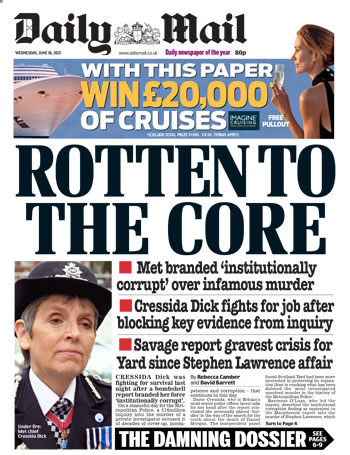
For a woman in charge of a mighty organisation, Ms B does seem to have shown an extraordinary lack of interest in the activities of her employees. This week, we learnt that she was also “totally unaware and surprised” that one of her reporters was likely involved in a plot to discredit a policeman investigating the repeated failures of the Metropolitan Police to bring the murderer of Daniel Morgan to justice.
Morgan, a private investigator, was found dead in a pub car park in 1987. Jonathan Rees, his business partner at Southern Investigations, was twice charged with murder, but both prosecutions were abandoned. There have been five inquiries into the way the police investigated the case and in 2011 the Met accepted that corrupt officers had shielded the killer or killers. On Tuesday, Lady O’Loan published her 1,200-page report into the case after an eight-year inquiry, concluding that the Met was “institutionally corrupt”.
That’s a pretty sensational finding, reminiscent of the Macpherson conclusion that the force was “institutionally racist” after his investigation into the failings of the Stephen Lawrence murder investigation. That made every front page. But, even with lingering Line of Duty mania, only the Mail, Guardian and Times thought that a whole wallet full of bent coppers merited big headlines on page 1. The Telegraph didn’t think the report worth as much as a nib, deeming an advertising boycott of GB News and the possibility of power cuts sometime in the future because of climate change more interesting.
The Mail went gangbusters – but it’s had its teeth into the Met in general and Commissioner Cressida Dick in particular for a long while. The Guardian and Times both made the story second fiddle to their splashes on compulsory Covid vaccinations for care home staff. Well, it was a long time ago. And we know from the muted coverage of the BBC and Martin Bashir how little interest there is in institutional wrongdoing from another century.
After the murder, Southern Investigations made a healthy business out of selling confidential information from corrupt police to newspapers.
Hold page 26!
Maybe that was the explanation for the Sun’s positioning of the report as a suppressed page lead on page 26 and the Express’s decision to put it on page 15, after the comment section – both papers having the latest episode of the Bashir saga further forward in their books.
After the murder, Southern Investigations made a healthy business out of selling confidential information from corrupt police (a former officer took Morgan’s place as Rees’s partner) to newspapers, notably the News of the World and the Daily Mirror – whose investigations editor and one of three key media contacts for the detective agency at the time was Gary Jones, now editor of the Express.
Another key contact was Alex Marunchak of the News of the World. It was he who was accused of colluding with Southern Investigations to sabotage Detective Chief Superintendent Dave Cook’s investigation into previous police failings by intimidating him and his family. The O’Loan report says it couldn’t prove that that was the case, but that there was very strong circumstantial evidence to suggest that they had. Cook and Jacqui Hames were put under surveillance in what Brooks “reportedly indicated” to police in 2003 was the pursuit of “a legitimate story about a marital affair”. Cook and Hames had been married for 11 years. Brooks was “totally unaware and surprised” that there might be another agenda.
The Daniel Morgan murder story is long and tangled. So is the O’Loan report. Journalists have little time to read such documents before they are required to get the most important facts across to their audience in the most readable fashion. Naturally the “institutionally corrupt” verdict and the renewed pressure on a Met Commissioner already under fire over the Sarah Everard vigil and Extinction Rebellion protests were the biggest news lines. Nobody is interested in journalists and historic newsgathering methods anymore, are they? That was all sorted with hacking and Leveson, wasn’t it? Surely there can be absolutely no question that the Press might – as O’Loan said of the Met – be concealing failings for the sake of its public image?
Who cares that the assistant chief constable criticised by O’Loan for having a “totally inappropriate mindset” that led to a “failure to confront the issue of corruption adequately” was the same assistant commissioner who decided after one meeting that there was no new evidence that phone hacking was widespread within News International? Who cares that two other officers criticised in the O’Loan report went on to write columns for the Times and News of the World?
Certainly not the Government, which declined to proceed with Leveson 2, which was supposed to investigate this very network of police, politicians and Press and give thoughts on how healthy or otherwise it might be. The Home Secretary was accused on Tuesday of misleading MPs over that. Did she? She said the Government “formally consulted Sir Brian Leveson” and “decided it was not in the public interest to proceed”. Sir Brian in fact “forcefully disagreed” with the idea of abandoning the second part of his inquiry. But Priti Patel didn’t say he agreed; she just said he was consulted.
Pin-dancing anyone?
How very dare they!
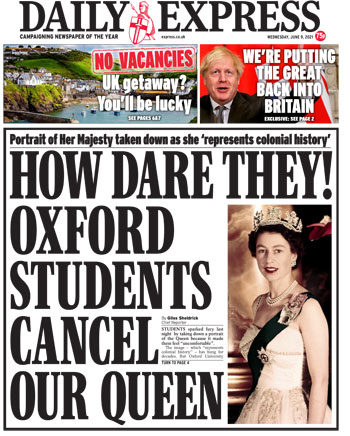
Any decent human being looks out for their recently-widowed granny. But sometimes we forget that our grandmothers aren’t frail little old women, but people with a wealth of experience and a lifetime of dealing with slights and inconveniences. “Don’t fuss!” is not a phrase that will come new to most of our ears. Indeed, our newspapers make much of the indomitable spirit of the Blitz generation.
Which makes the obsession with “protecting” the Queen incongruous. She is 95 years old. She has been our head of state for nigh on 70 years. She has mostly managed to keep together a dysfunctional family and an at-times fractious Commonwealth. She can probably cope with a few students deciding that didn’t want her gazing down at them while they drink tea and chat with their friends.
But to judge from the headlines last week - “How dare they! Oxford students cancel our Queen” and the Mail’s even more hysterical “Outrage as Oxford students vote to axe Queen” – you would think the world was about to end. It was such a scandal that the government minister whose day job is supposed to be making sure that our children are properly educated and get fair exam grades felt it necessary to pitch in with an opinion.
The stories accompanying such ludicrous headlines made much of the fact that Magdalen is one of the oldest Oxford colleges, founded in 1458. Five hundred and fifty five years later, a group of students decided to put up a picture of the Queen in their middle common room. Eight years on, another group of students decided to take it down. It isn’t a precious oil painting. It isn’t an historic portrait in the great hall. It’s the equivalent of a Che Guevara poster on a teenager’s bedroom wall. The present occupants decided they could live without it. How about a bit of perspective?
Even the Mail struggled to keep a straight face as it expostulated. Inside, a leader accepted that very point; it wasn’t the removal of the picture that was the problem – it was the reason it was taken down. Some students were uncomfortable with it as a symbol of Britain’s colonial past. That, for the Mail, was yet another example of wokeness taking over – and there was a chorus of rarely heard voices, from Toby Young to Iain Duncan Smith to join Gavin Williamson in remonstration.
Students are supposed to be woke. They’re supposed to rebel; the mystery here is how the picture was ever put up in the first place. We don’t expect them to decorate the walls of their leisure space with Establishment figures. The whole fandango was, to use Williamson’s word, absurd.
Students are supposed to be woke. They’re supposed to rebel; the mystery here is how the picture was ever put up in the first place.
It's all in the name
Thank heavens for these knights in shining armour ready to defend the Queen at the drop of a dainty handkerchief, for their services were further required when it came to the naming of her latest great-grandchild.
To recall, there was great delight when Kate and William referenced the Queen and the Princess of Wales when they called their daughter Charlotte Elizabeth Diana. And equal joy at the Mountbatten evocation when Louis followed. So cheers all round when Harry announced the birth of Lilibet Diana? You’ve got to be kidding. How dare they use the Queen’s childhood nickname? Did they ask permission?
We all know that naming babies is fraught. You happen to like the name of one of your parents, dare you use it or will everyone think the child has been named after them, leaving the other grandparents with their noses out of joint? Safest, if you want to use “family” names, to go for someone who’s dead. But I’ve never before heard of anyone being offended because a child was so obviously named for them. So, the Press had to be offended on the Queen’s behalf. It was a cheek, another example of the Sussexes’ entitled presumption and audacity.
And then a Palace flunky had to tip the BBC that the Queen’s permission hadn’t been sought.
Who asks someone’s permission to name their child? As with Ms Patel above, you have to look at the words and what they actually say rather than rely on what you think they mean – or even what you think was implied. Not asking permission does not equal not mentioning it. Of course they’d spoken about it. And so, Harry and Meghan hit back – yet again – with a solicitor’s letter to the BBC.
Cue further front-page outrage from the Mail: “Only THEY could call in lawyers over their baby’s name”. Except, of course, they haven’t fired off a letter over a name. They have fired a shot across the bows of gabby courtiers to address what they see as a far bigger problem: the constant negative briefing from within the Palace to voracious media always happy to pick up another stick to beat them.
I’ve never before heard of anyone being offended because a child was so obviously named for them.
(Under) reporting Grenfell
With all this royal controversy, it’s amazing there’s room for any other news in the papers. There didn’t seem to be much space, for example, for an examination of how safety improvements are going on tower blocks four years after Grenfell. Thousands of people are still living in dangerous blocks and some leaseholders are being asked to pay £100,000 to make safe properties that are worth only £90,000. People in places like Salford, where the Government is supposed to be “levelling up” and helping aspirational young people on the first rung of the housing ladder.
Those affected have tried to use the anniversary to press their cases: The Times reported that housing associations had written to Robert Jenrick saying people faced ruinous costs, the Guardian that Grenfell survivors were accusing the Government of playing Russian roulette with fire safety. The Telegraph has been assiduous in telling these stories – but tucked away on the front of their Saturday Money section, which for many families goes straight into the recycling.
There were plenty of “That was the last time I saw him” human interest stories from Grenfell families – many of whom have still not been given the help they were promised – but these are almost a distraction from an ongoing scandal that seems to get sustained attention only from the likes of Private Eye. Yes, readers get bored reading the same story over and over. But telling the same story over and over doesn’t seem to be a problem when it’s “We’ll be free of lockdown soon”, “Boris’s Britain is booming” and “Meghan and Harry are horrible”. This is a drum that needs beating. If the will were there, we’d be hearing it.
This is a drum that needs beating. If the will were there, we’d be hearing it.
Why don't we lead with Covid this time
Instead, we get endless speculation about whether we’ll be sticking to the roadmap out of lockdown, when we can go on holiday or to the pub and daily updates on who’s next for the jab. Of course, all of this matters to all of us, but there is precious little news here.
It used to be the Express that was the hypochondriac of Fleet Street, but these days the usually sensible i is eyeing that bed. Of 138 front pages this year (up to today), more than 100 had a Covid splash, with a further dozen indirectly linked to the virus – the Cummings testimony, the Cameron lobbying, the row over the nurses’ pay rise. There were a handful each about racism and Trump and Biden, a bit of royalty, and three on the Super League football fiasco. But by far the most popular topic of the year for the paper has been vaccination – with 49 front pages. Even the old Desmond Express might think that a little OTT.
In other news…
Hurrah, then, for Metro, which managed to break out of the Covid / Boris / royals news vortex to bring two totally unrelated lead stories on successive days last week. First the fantastic FBI app sting that trapped thousands of criminals across the world – a truly different and exciting news story that just has to be fuel for Hollywood. And then the opening of the Bibaa Henry-Nicole Smallman murder trial at which the accused teenager was said to have “sacrificed” the two women in a lottery-win pact with the Devil. This was an horrific attack that didn’t get anywhere near the attention it deserved at the time – and especially when compared with the coverage of Sarah Everard’s disappearance.
Both of these stories could rightly be defined as “hard news”, which used to be the stock in trade of newspapers. In an era of celebrity pap, faux outrage, government propaganda and health scares, it’s nice to see an editor remembering that. More please.
Launch of GB News
Finally, while this is a print-focused notebook, it would be remiss not to mention the most-hyped media event of the week: the launch of a new TV station. GB News promises to give a voice to the “silenced majority”, so I trust we can expect to hear from food bank clients in Hartlepool, disabled job seekers in Cornwall and exhausted delivery drivers from Wolverhampton.
Obviously, it will take time to find articulate representatives for such people, so in the meantime, viewers have had to make do with other little-heard voices expounding on little-aired subjects such as lockdown, immigration and cancel culture. These included station founder and Spectator chairman Andrew Neil (1.1m Twitter followers), The Sun’s Dan Wootton (377.6k), The Telegraph’s Allison Pearson (82.8k) and Carole Malone of the Express (52.2k). Others to make early appearances included the reclusive and much-silenced Nigel Farage, Lord Sugar and Roger Daltrey.
Within two days, the channel had scored two hits: being chosen to pose the third question at the Prime Minister’s Covid briefing and becoming the subject of a boycott campaign. A clutch of advertisers decided they didn’t want their products associated with the station, possibly thanks to pressure from the Stop Funding Hate group that targeted certain newspapers a few years ago.
Talk about playing into the enemy’s hands – if you regard GB News as the enemy, which SFH seems to. The boycott gave Neil’s project extra publicity just when it needed it. Advertisers will decide soon enough whether the Union Flag-cloaked anti-woke rhetoric is a good fit for their wares. There’s no need to try to strangle this baby at birth. It will either develop a strong set of lungs, in which case we may have to accept that it really does speak for the nation, or choke on its own bile.
The boycott gave Neil’s project extra publicity just when it needed it.
Liz Gerard’s Notebook is a fortnightly column published in the InPubWeekly newsletter. To be added to the mailing list, enter your email address here.












